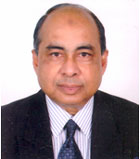You are here
Speaker Profile: Dr M. Rahamatullah
 Dr. M. Rahmatullah was the Director of Transport and Infrastructure Development at UN-ESCAP, Bangkok, and retired in June 2000, after 22 years of service with the United Nations (UN). Prior to his appointment to UN-ESCAP, he was the Joint Chief, (Transport) Planning Commission, He holds a Ph.D. in Transportation Planning from the University of Liverpool, UK. He was a founding faculty member of Urban and Regional Planning Department at EPUET (BUET).
Dr. M. Rahmatullah was the Director of Transport and Infrastructure Development at UN-ESCAP, Bangkok, and retired in June 2000, after 22 years of service with the United Nations (UN). Prior to his appointment to UN-ESCAP, he was the Joint Chief, (Transport) Planning Commission, He holds a Ph.D. in Transportation Planning from the University of Liverpool, UK. He was a founding faculty member of Urban and Regional Planning Department at EPUET (BUET).
He worked as the Programme Director, Centre for Policy Dialogue (CPD) up to 2006 and authored two Policy Briefs in Transport, and also pursued regional cooperation in transport among SAARC and BCIM countries.
As a team leader he authored the SAARC Regional Multimodal Transport Study (SRMTS) and prepared Strategic Transport Plan (STP) for Greater Dhaka in 2006. In mid-2007, as a Deputy Team Leader, he prepared the Road Master Plan for Bangladesh.
He has also been working as the Transport Policy Advisor in the Bangladesh Planning Commission. He is also an Advisor to the establishment of Road Fund in Bangladesh.
He is a Fellow of the Institution of Engineers, Bangladesh as well as Bangladesh Institute of Planners, Dhaka, and a Fellow of E.D.I., World Bank, U.S.A.
ABSTRACT
Regional Transport Connectivity: Getting Past the Impediments
To establish a case for regional transport connectivity in South Asia, the paper made an analysis of the impact of non-cooperation in transport connectivity. An assessment was also made of the unique geographical location of Bangladesh having two landlocked countries, such as Nepal and Bhutan and one semi-landlocked territory, NE-India at the hinterland, and the opportunities this situation provides to Bangladesh to play a crucial role in establishing regional connectivities. Based on SAARC Regional Multimodal Transport Study (SRMTS), the paper identified a few strategic routes which could be pursued to provide transport connectivities among the countries of NE Sub region of South Asia.
The paper concluded that the cost of non-cooperation being very high. However pointed out that issues related to regional connectivity and transit cannot be resolved in isolation. It needs to be considered together with other unresolved issues, in the areas of water sharing, environment, marine boundary, etc. What is needed for a long lasting solution is the political will and commitment of the leaders of South Asia, who should sit together with an open mind to resolve various issues once for all, through a process of give and take.
